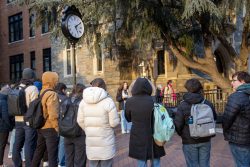The Licensing and Oversight Committee recommended last Friday that Georgetown end its contract with Adidas no later than Dec. 15, due to the company’s violation of Georgetown’s Code of Conduct for Licensees. The company has refused to pay the $1.8 million owed in severance to workers of the PT Kizone factory in Indonesia for violation of local labor laws.
The LOC decided to make the recommendation to the President’s Office following a report from the Workers’ Rights Consortium, a meeting with an Adidas representative, and demonstrations of student support guided by the Georgetown Solidarity Committee.
Gregg Nebel, the Adidas representative, told the committee in April 2012 that the company would give the workers food vouchers and job placement assistance. Adidas, in a statement to the Voice this week, said that the company would provide $525,000 in “humanitarian aid” with the food vouchers. It also said it would “address the systemic root cause of unethical factory closures.”
“At our request, the Global Forum for Sustainable Supply Chains will convene a summit … to consider options for a private insurance fund,” Adidas announced in the statement. “This unique approach looks to close one of the critical gaps in governance where countries have legislation providing for severance pay, but very few require the employer to make provisions for eventual severance obligations.”
Nike and the Dallas Cowboys, the two other companies using the factory, have paid the severance owed to the workers, and were not included in the LOC’s statement.
Scott Fleming, Interim Chair of the Committee, said these remediation attempts are insufficient in complying with the “letter and spirit” of the Code of Conduct for Licensees.
“Adidas has made what they feel are remediation efforts,” said John Kline, Director of the LOC. “They weren’t really addressing the major nature of the issue. They are trying to do other types of things but not accept responsibility for the severance pay itself.”
In its press release, GSC, which has two members on the LOC, was confident that President John DeGioia will follow the recommendation. The President’s Office was aware of the LOC’s impending action and is “giving it careful consideration.” Georgetown would be the third university severing ties with the company, following Cornell University and Oberlin College.
In addition to the LOC’s recommendation, GSC protested in Red Square in April and delivered two letters to the President’s Office, one in April and one in September, suggesting the school terminate its contract.
“While it might not make a huge impact financially for Adidas if we terminate the contract, I think the fact that Georgetown would be making this gesture to show Adidas that we do care about these issues would be an example for other universities,” said Julia Hubbel (COL ’15) , member of GSC and LOC. “In the past Georgetown has also been a leader in these issues. There was a campaign against Russell, which had a factory in Honduras, and Georgetown was the second university to cut the contract.”
Georgetown chose not to renew the sportswear contract with Russell Athletic in Feb. 2009 because the company was accused of closing a Honduras factory in effort to prevent unionization. Several other universities also severed ties, leading to the company’s decision to reopen the factory that November.
“The University, as happened in the case of Russell Athletic, has shown that it really takes seriously the principles involved in licensing manufacturers who license our logo,” said Joseph McCartin, Executive Director of Georgetown’s Kalmanovitz Initiative for Labor and the Working Poor. “It was a clear evaluation of what we believe is the right way to treat workers.”
To further improve the University’s ability to adhere to its Jesuit values and, through this, advance workers’ rights, the LOC is looking into the Designated Supplier Program, according to Kline. The Worker’s Rights Consortium has suggested this approach as an alternative to responding to the abuse of workers’ rights in a case-by-case basis.
Kline said the goal of this program is to consolidate manufacturing in fewer, more easily monitored factories that provide a living wage and good conditions. He said this would prevent cases, such as Adidas’s refusal to pay, so that the University would not have to react after the fact as is how such decisions are currently made.
According to the LOC, the recommendation marks the end of its work with the Adidas case. Although all the administrative channels have been used in this effort, GSC maintains that students can and should still demonstrate support for the termination of the contract to ensure that the administration follows the committee’s suggestion.
“Just because we’ve cut our contract that does not mean the workers in Jakarta are being paid,” Hubbell said. “The workers themselves have not yet achieved success and we can’t celebrate until that happens.”





